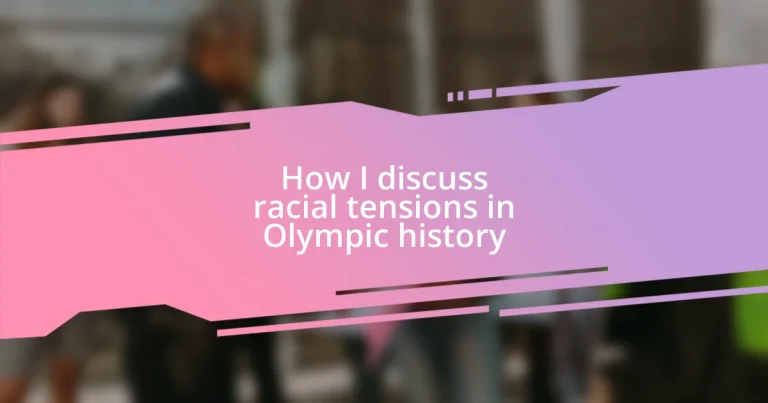Key takeaways:
- The 1968 Mexico City Olympics highlighted racial tensions with Tommie Smith and John Carlos raising their fists in protest, symbolizing the intersection of sports and social justice.
- Jesse Owens’ victories at the 1936 Berlin Olympics challenged Nazi ideology, while the 1980 US boycott of the Moscow Olympics showcases the impact of geopolitical issues on athletes.
- Influential athletes like Colin Kaepernick, Muhammad Ali, and Serena Williams have used their platforms to address racial injustices, illustrating the ongoing relevance of activism in sports.
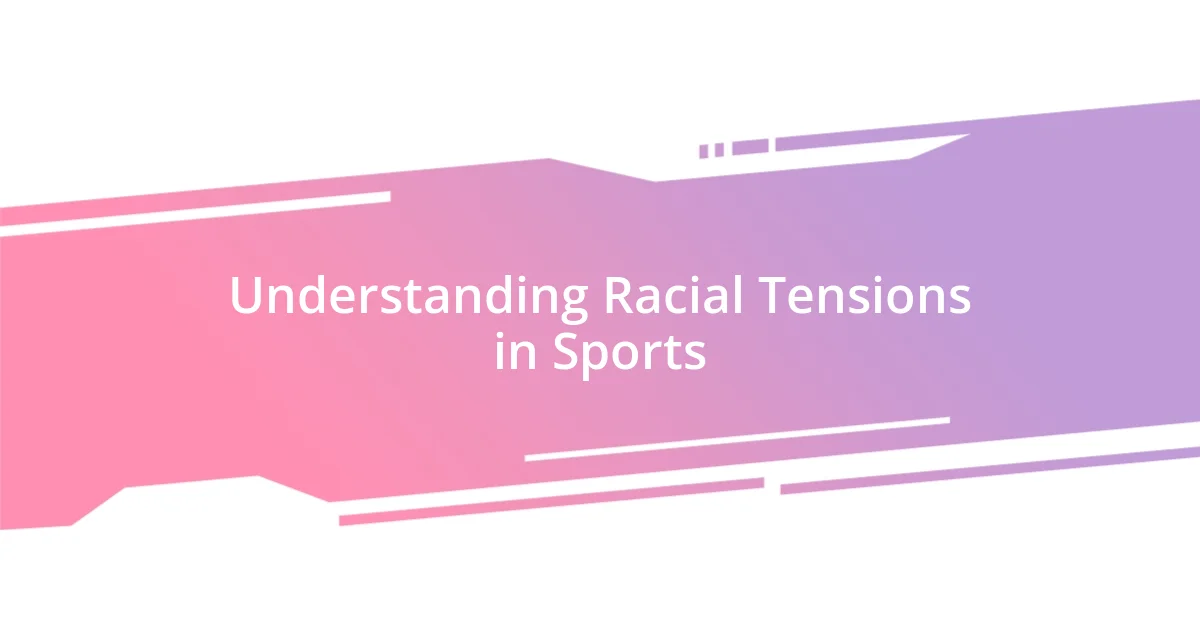
Understanding Racial Tensions in Sports
Racial tensions in sports have often mirrored broader societal issues, making athletic events a powerful reflection of cultural conflicts. I remember watching the 1968 Mexico City Olympics and being struck by the images of Tommie Smith and John Carlos raising their fists in protest. Their defiance wasn’t just about the games; it was a poignant reminder that sports can’t be separated from the realities of race relations.
When athletes take a stand for their beliefs, it can ignite passionate conversations—just like the protests we see today. Have you ever paused to think about the weight that athletes carry? For many, it’s not just about the medals; it’s about using their platform to address injustice, which can be a heavy burden.
In my view, the historical context of these actions reveals profound truths about courage and solidarity. Athletes who speak out often face backlash, yet they choose to highlight these tensions, engaging us all in a conversation about race. How do we support these athletes while reflecting on our own views? The answer lies in understanding the unique intersection of sport, race, and personal identity—an exploration that continues to unfold with each Olympic Games.

Key Olympic Events Highlighting Tensions
The 1936 Berlin Olympics remain a stark example of racial tensions influencing the games. I often think about how Jesse Owens, an African American athlete, put on a remarkable display, winning four gold medals amidst the Nazi regime’s propaganda. His triumph not only challenged Hitler’s ideology of Aryan superiority but also resonated deeply with those of us who understand the struggles against oppression. Can you imagine the weight of representing your race against such a backdrop? It’s a vivid reminder of how sports can transcend competition and act as a platform for social change.
Fast forward to the 1980s, and we encounter the controversial decision by the United States to boycott the Moscow Olympics in 1980. This protest against the Soviet invasion of Afghanistan stripped athletes of their opportunity to compete, a personal sacrifice that still weighs on many hearts. I’ve spoken with athletes from that era who expressed feelings of regret and loss, emphasizing that for them, sport was not just a hobby; it was a lifelong dream interrupted by geopolitical tensions. Their stories resonate with me because they reveal how broader issues can deeply affect personal aspirations.
The 2008 Beijing Olympics also brought race and politics to the forefront. I recall watching the opening ceremony, feeling excited yet aware of the underlying tensions surrounding China’s human rights record. It left me reflecting on the athletes who trained for years only to find themselves competing in a nation with complicated issues. How do athletes navigate that duality, where celebration meets concern? This complexity makes the Olympics a fascinating lens through which we can explore racial and political dynamics, creating a rich tapestry of human experience.
| Year | Event Highlight |
|---|---|
| 1936 | Jesse Owens’ victories challenging Nazi ideology |
| 1980 | US boycott of Moscow Olympics |
| 2008 | Beijing Olympics amid human rights discussions |

Influential Athletes and Their Impact
Athletes have historically played pivotal roles in shaping discussions around race, often turning their personal experiences into powerful statements. I think of Colin Kaepernick and his decision to kneel during the national anthem, a bold move that ignited a nationwide focus on systemic racism. His actions resonated with many, including myself, leading to a wave of both support and backlash, which speaks volumes about the challenges athletes face when using their platforms for change.
Here are some influential athletes who have made a lasting impact:
- Muhammad Ali: Refused to be drafted into the Vietnam War, citing racial injustice, which cost him his title but earned him global respect.
- Jackie Robinson: Broke Major League Baseball’s color barrier, inspiring generations and bringing attention to racial discrimination in sports.
- Serena Williams: Has consistently used her platform to advocate for equal pay and against racial discrimination, speaking on issues close to her heart.
- LeBron James: Actively engages in social issues, using his fame to address racial inequalities and empower his community.
These athletes illustrate that the intersection of sport and social justice is not just a historical discussion; it remains a vital conversation today. Their stories reflect the intertwined nature of race, identity, and personal struggle, leaving me inspired and contemplative about the ongoing fight for justice.
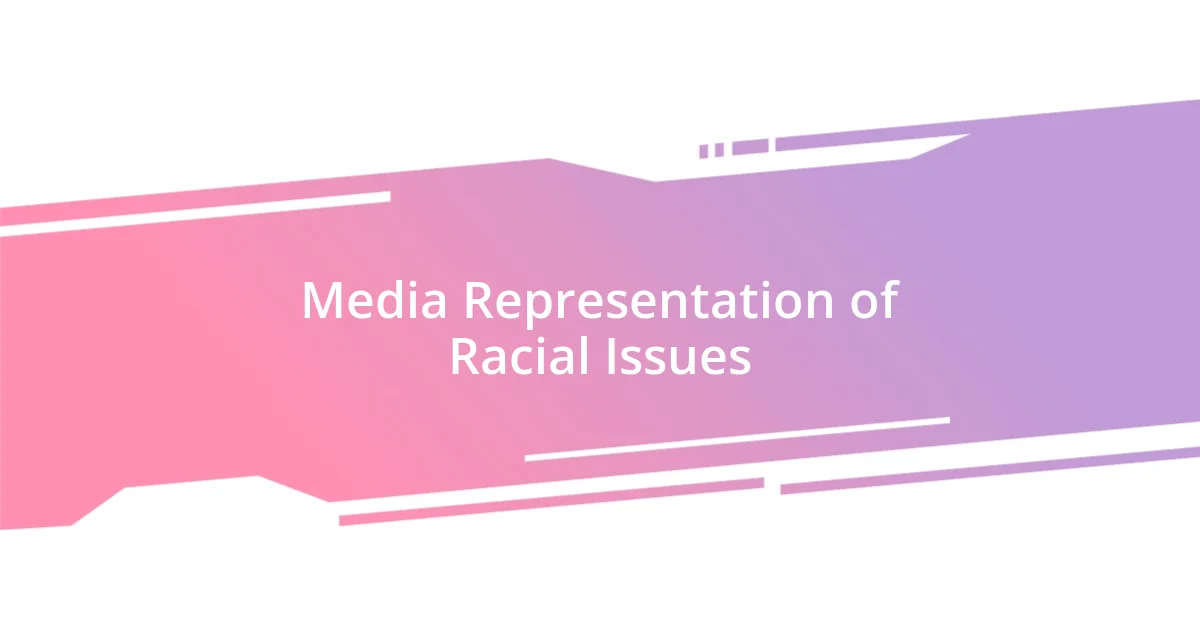
Media Representation of Racial Issues
Media portrayal of racial issues in the Olympics is often a reflection of societal attitudes, both past and present. I remember watching coverage of the 1968 Mexico City Olympics, where Tommy Smith and John Carlos raised their fists during the medal ceremony. That moment sent shockwaves through the media, causing heated discussions about race and protest. It made me wonder—how could a single gesture encapsulate so much emotion and history in a fleeting moment?
In my view, the media has both uplifted and distorted narratives around race in Olympic history. For instance, the way stories are framed can significantly influence public perception. I think about how coverage of African American athletes sometimes leans into stereotypes rather than celebrating their achievements. It’s disheartening to see that even today, the narratives surrounding athletes can overshadow their triumphs. How do we ensure that the media focuses on their dedication and skill rather than the color of their skin?
I can’t help but feel inspired by how athletes have harnessed media attention to elevate conversations around race. During the 2020 Tokyo Olympics, I found myself moved by the way athletes used their platforms to speak out on social justice. Watching athletes like Gwen Berry raise their fists during the national anthem made me reflect on the sacrifices they’re willing to make. How much courage does it take to stand up in front of the world, knowing the backlash they might face? It’s moments like these that prove the Olympics are about more than just medals; they are an arena for necessary and often uncomfortable conversations about race and equality.
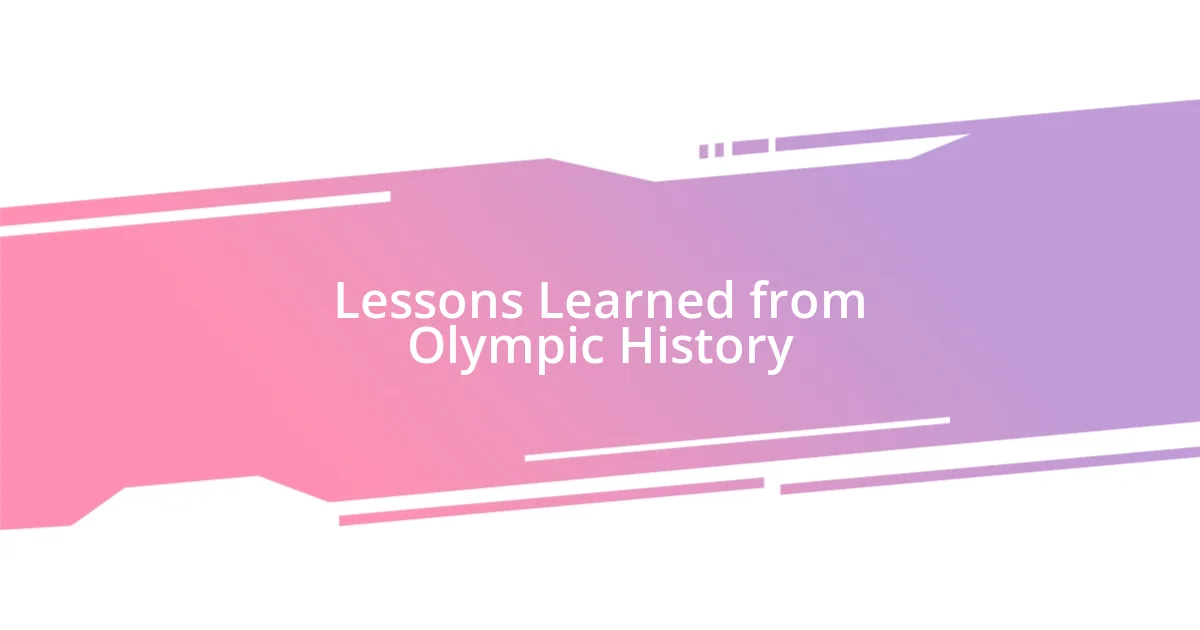
Lessons Learned from Olympic History
Throughout Olympic history, one crucial lesson stands out: the bravery of athletes to speak their truth can challenge societal norms. I vividly remember the intense emotions that surrounded the actions of Smith and Carlos in 1968. Their bold stand forced me to reflect on the power of protest and how a single moment can redefine a generation’s understanding of justice. Why is it that such impactful statements still resonate deeply today, decades later? Because they remind us that courage frequently emerges in the face of adversity, highlighting the ongoing journey toward equality.
Another key takeaway is the evolution of public perception regarding race and sport. Consider how the narrative around athletes of color has shifted over the years. We’re no longer just witnessing one-dimensional portrayals; instead, there is a growing recognition of their complexities and contributions. But I often ask myself, are we doing enough to recognize this change? Celebrating these athletes fully requires us to dismantle long-standing stereotypes, allowing their stories to be told in all their richness and nuance.
Lastly, the Olympics serve as a mirror reflecting broader societal issues. When I think about the racial tensions that have erupted during various Games, it’s striking how these moments often galvanize people toward change. Take the recent Olympics, where discussions around race and equality made headlines alongside athletic achievements. It leaves me hopeful but also questioning what more can be done to sustain this momentum. How do we ensure that these lessons of resilience and advocacy become ingrained in not just sports, but in our daily lives as well? The answers lie in continuing the dialogue sparked by the Olympic spirit, pushing for a world where equality isn’t just a dream, but a reality we all work toward together.
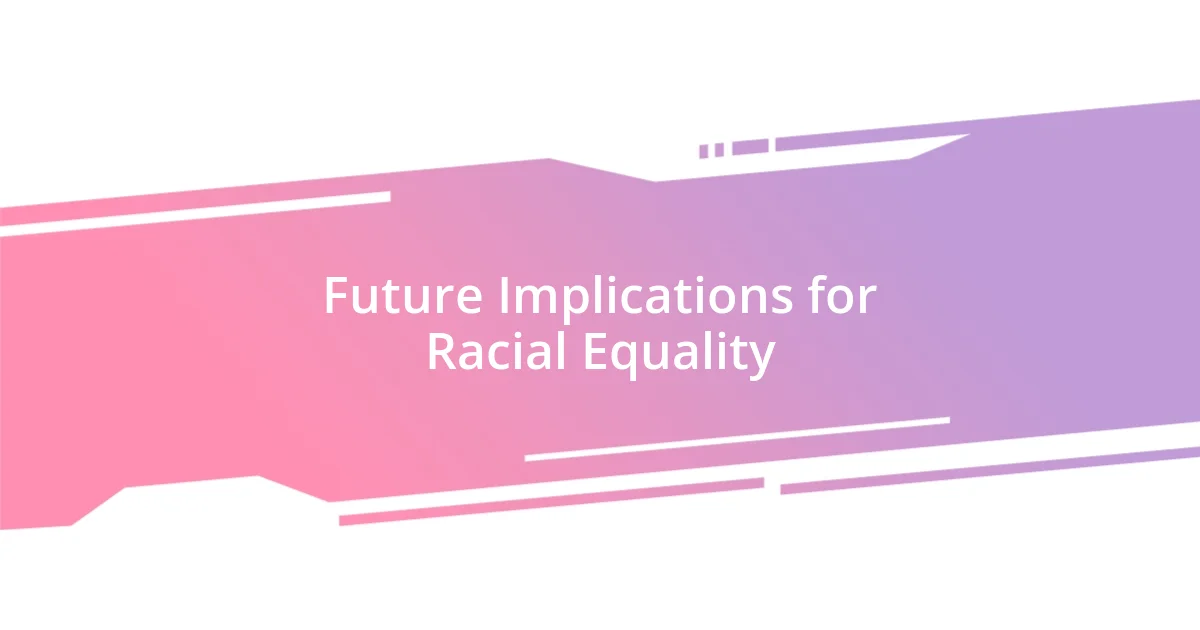
Future Implications for Racial Equality
As I ponder the future implications for racial equality in the context of the Olympics, I can’t help but feel a sense of urgency. The moments we witness on the Olympic stage have the power to inspire change, but they also serve as a reminder of the work still required. I think about the young athletes who are watching—what kind of legacy are we leaving them? Are we equipping them to challenge the status quo or simply encouraging them to stay silent?
Reflecting on recent Olympic movements, it’s evident that each athlete’s act of defiance is a step toward a more inclusive future. I remember feeling a spark of hope when I saw athletes advocating for mental health and racial justice simultaneously. Their ability to intertwine these issues brought a new depth to the conversation. It makes me wonder, can we harness the passion of these athletes to fuel long-lasting change? It’s crucial for us, as a society, to support them in this journey—not just during the Games, but continuously.
Looking ahead, it’s vital that we cultivate spaces for dialogue around race and equality within the sports community. I think about the importance of education, not just for athletes, but for fans and organizations too. How do we ensure that everyone understands the historical context of these movements? By actively engaging in discussions about race, we can create a culture that values inclusion and compassion, making the Olympic spirit something that extends far beyond the medals and podiums.












